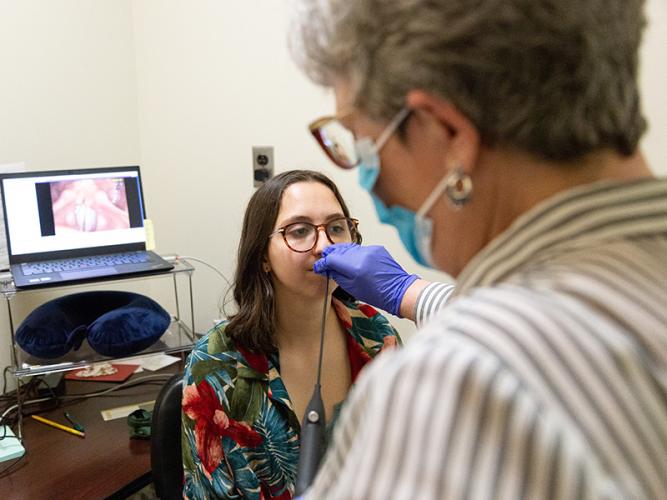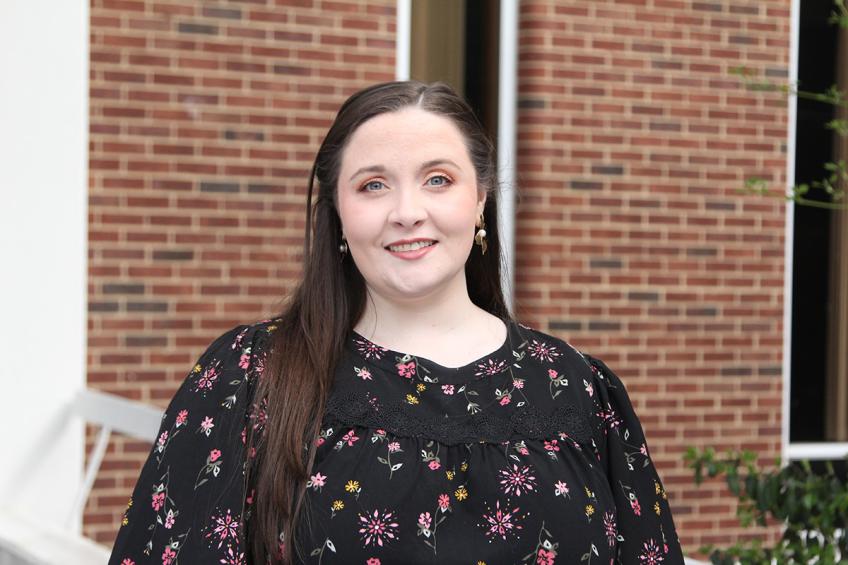

One exciting new initiative in the Ohio University School of Music brings innovative vocal preservation technology to support students and performers whose voice is their instrument.
Similar to the way athletic programs keep in-house staff readily available to protect the fitness of athletes, the Vocal Wellness Program (VWP) exists to protect the voices of those whose careers depend on it.
The program began with Margaret Kennedy-Dygas’ dream. Kennedy-Dygas, D.M., CCC-SLP, is a professor of music, specializing in voice and voice pedagogy, and is the co-director of the Vocal Wellness Program, along with Youngsun Kim, PhD, CCC-SLP, from the School of Rehabilitation and Communication Sciences.
According to Kim, “[the] voice wellness program is a unique and excellent opportunity for graduate speech pathology students….to meet singers and actors who use the vocal folds professionally. With this program, students can hear and judge the vocal problems. In addition, they can see vocal folds directly. Then, SLP students can develop a treatment plan with a collaboration with singing teachers.”
In 2017, after completing a Certificate in Vocology, Kennedy-Dygas began to do voice screenings as a service to voice students in the program. She has used perceptual, aerodynamic and acoustic measurements using available technology.
“These are specific evaluative approaches that provide important data about the status of the speaking and singing voice. I still use these measurement approaches, albeit with superior equipment. And of course, beginning in January 2023, we have added laryngoscopy to our arsenal of evaluation tools.” said Kennedy-Dygas.
In the summer of 2021 she was licensed through the State of Ohio as a speech language pathologist, allowing her to conduct laryngoscopic examinations, though formal medical diagnosis is the province of physician specialists.
The Vocal Wellness Program was awarded an 1804 grant in July 2022 to purchase a portable laryngoscope system. Space, supplies and equipment had to be approved and organized, along with protocols for protecting student information. The Vocal Wellness Program launched in January 2023 after all of these matters were finalized.
According to arts administration student Molly Cerep, who earned her master’s degree in vocal pedagogy and performance last year, the process begins with a student filling out an index to determine how their voice feels, and then they complete a series of exercises and readings, which Kennedy-Dygas can both aurally and technically analyze using computer software.

The program was awarded a grant to purchase laryngoscope equipment in January of 2023. In addition to the acoustic analysis, students can now get scoped for a visual of their vocal cords. Cerep describes the process as “not fun, but necessary.”
Two weeks before this semester's opera performance, disaster struck when Cerep started to lose her voice. Luckily, she was able to seek aid through the VWP. “She was able to tell that there was a lot of swelling going on, or she would have been able to visually see if there was actual damage, like a node or nodule,” she said. “It gave me security and peace of knowing that I was just sick.”
After the scoping process, Kennedy-Dygas shares the images and videos of the vocal cords with the student and their voice teacher, along with a thorough report and possible next steps, which may involve a recommendation to see an otolaryngologist, or a series of exercises to help train the voice.
Cerep notes that in her primary focus of teaching, her voice takes on a considerable amount of strain. “Having to keep my voice healthy and consistent is important, and having that evaluation is priceless,” she said. Cerep believes that the VWP is a unique and convenient program that professional voice users should take full advantage of.
One of the most valuable parts of this program is the compassion of the directors. In Kennedy-Dygas’ words, “a person's voice is who they are. It’s their identity, and to have a voice really means something to a human being - to be able to speak, to be able to express. When we have the ability to take a look and analyze how that voice is functioning, it's very powerful, but we also have to be mindful that we are invading space and privacy and literally the body of another human being.”
The program operates out of Glidden Hall, for the convenience of the students in the School of Music who are its primary participants, but is available free of charge to any students in the College of Fine Arts enrolled or participating in voice, choral or acting coursework.
Students can choose to request this specialized support, and can be referred by their voice teachers. Kennedy-Dygas said that the voice faculty have never been wrong when they have noticed a change of concern in a student’s voice. Voice students may also come in for a baseline screening when their voice is healthy. In that case, Kennedy-Dygas has a standard with which to compare if the student experiences voice disorder in the future.
To date, the VWP has already provided support to more than 40 voice students, some returning for multiple visits. Kennedy-Dygas believes that with continual work and improvement, the VWP could conduct some research in the future, but for now, the program relies on the willingness of determined students to put time and energy into sounding their best.
For more information, please see the Vocal Wellness Program website .

